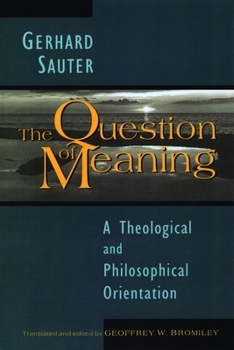The Question of Meaning: A Theological and Philosophical Orientation
Select Format
Select Condition 
Book Overview
This is a print on demand book and is therefore non- returnable. In this penetrating study of the concept of meaning, Gerhard Sauter shows that -- contrary to popular belief -- the human quest for meaning is a relatively recent development, arising only after the deconstruction of metaphysics at the end of the nineteenth century. Since then, people have continually sought after the meaning of history, the meaning of their labors, their sufferings, their lives. In an attempt to construct new areas of orientation, meaning has become a dominant term in hermeneutics, in philosophy of language, in psychology, in sociology, in social theory, and in all domains influenced by them, including politics. In former times the term meaning related to statements that could be proven as either true or false, while the term sense marked the ability to perceive reality and to respond to it. In this careful and elaborate analysis of the history of the term meaning, Sauter reevaluates the differences and the connections between meaning and sense in the context of an age that has jettisoned its own metaphysical moorings. Sauter interprets biblical references to meaning -- in Job and Ecclesiastes, for example -- and compares them with modern concepts of the term. He probes beyond the quest for meaning to ask what the quest itself means, and questions whether the modern quest for meaning in fact weakens our perceptions of everyday reality. His conclusions lead to a new kind of quest: an intellectual and spiritual adventure to discover sense encountering contingent reality.
Format:Paperback
Language:English
ISBN:0802807240
ISBN13:9780802807243
Release Date:November 1995
Publisher:William B. Eerdmans Publishing Company
Length:166 Pages
Weight:0.55 lbs.
Dimensions:0.4" x 6.0" x 9.1"
Customer Reviews
1 rating
What Dare We Hope for the Quest for Meaning?
Published by Thriftbooks.com User , 19 years ago
"The stream of consciousness we experience within ourselves throughout our lives ties together all events of physical existence like the silken string that holds together a necklace. In its realization, man and woman will meet their journey's end, the Omega Point,..." Ultimate Pinnacle of The Human Quest Humanity Quest for Meaning: Mortals exist in a world of conflicting philosophies, religions, and views about fundamental matters of value. As a consequence, we are affected by this modern 'Tower of Babel,' wondering about the truth of our own beliefs, their objective values and common ethical ground in the arena of conflicting beliefs. Working in Canada at the turn of the century, Dr. Henry Sharman, a University of Chicago theologian and scientist, sought to unify the disciplines of science and religion in the belief that each searched for the same universal truths about reality. This feature of contextuality explains why 'The quest for meaning', has aspired to absoluteness. Biblical Quest for Meaning: Ecclesiastes, is a biblical philosophy, of the wisdom books of the Old Testament. As we wander through his eventful life, we learn that Solomon, Ecclesiastes alleged writer, searched for meaning everywhere, finding vacancy in all paths. When he surveyed his journey, he bitterly concluded that the earthly riches have not granted him enduring peace or righteousness, but instead have consumed him. Reflecting upon the journey, he realizes all of his finite efforts have produced little more than vanity. He concludes that the sum of his work will never be greater than its vacuous parts, that he must step outside of himself to find true meaning. In the book of Job the question of meaning in suffering has found its most vivid expression. Job's old friends attempted to justify to themselves the moral meaning of suffering, by convincing him of the moral justice of evil. In their eyes suffering could have one meaning, a punishment for sin, based on God's justice, that repays good with good and evil with evil. Sauter's Essay on Meaning: Gerhard Sauter comes to a conclusion, which he defends throughout his study of the explicit quest for the concept of meaning, as a recent development during the last century. Contrary to popular belief, based on OT wisdom books, he shows that the serious quest started with deconstruction of metaphysical concepts and the philosophical search for meaning of their lives, suffering as a part of the meaning of history. Sauter reconstructs his philosophical orientation in new areas. His areas are influenced by his training and expertise: theology, which recurs in recently revived hermeneutics, exploring related terrain in philosophy, of psychology, sociology and public life. He even questions what does the quest for meaning eventually means. As an Evangelical theologian, and recognized eschatologist, Sauter reinterprets the OT reference to meaning in the wisdom books, in the light of his spiritual and intellectual exploratio






